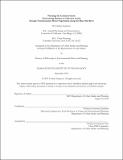| dc.contributor.advisor | Lawrence Susskind. | en_US |
| dc.contributor.author | Zaerpoor, Yasmin(Bijani Zaerpoor) | en_US |
| dc.contributor.other | Massachusetts Institute of Technology. Department of Urban Studies and Planning. | en_US |
| dc.coverage.spatial | fl----- | en_US |
| dc.date.accessioned | 2020-02-28T20:50:48Z | |
| dc.date.available | 2020-02-28T20:50:48Z | |
| dc.date.copyright | 2019 | en_US |
| dc.date.issued | 2019 | en_US |
| dc.identifier.uri | https://hdl.handle.net/1721.1/123913 | |
| dc.description | This electronic version was submitted by the student author. The certified thesis is available in the Institute Archives and Special Collections. | en_US |
| dc.description | Thesis: Ph. D., Massachusetts Institute of Technology, Department of Urban Studies and Planning, 2019 | en_US |
| dc.description | Cataloged from student-submitted PDF version of thesis. | en_US |
| dc.description | Includes bibliographical references (pages 179-186). | en_US |
| dc.description.abstract | We are headed towards a global water crisis. While technological advancements may help reduce this gap, achieving global water security will also require establishing self-enforcing agreements negotiated among countries that share transboundary rivers. At its core, transboundary water governance is a type of collective action problem (Olson 1965), in which sovereign actors must cooperate to achieve a collective interest. In this research, I attempt to delineate common procedural and context-specific barriers to collective action within transboundary water negotiations in the Nile River Basin. I compare efforts by three countries -- Egypt, Ethiopia, and Sudan -- | en_US |
| dc.description.abstract | to pursue collective action in two separate, but related, face-to-face negotiations related to water use: the basin-wide negotiations on the Nile Basin Cooperative Framework Agreement (1997 - 2010) and the ongoing project-specific negotiations on the Grand Ethiopian Renaissance Dam which started in 2011. Between 2015 and 2018, I interviewed over 50 Egyptian, Ethiopian, and Sudanese negotiators; transboundary water scholars and academics; and journalists and reviewed primary and secondary documents to identify the perceived barriers within these negotiation processes. The conventional approach to treaty-making is through negotiations among state actors. | en_US |
| dc.description.abstract | I argue that while many barriers related to the number of actors and degree of heterogeneity among them (as defined by differences in their capacity, access to information, preferences, beliefs, and identities) can be addressed through procedural interventions, non-procedural interventions by both state- and non-state actors are necessary to reduce these barriers at different scales (e.g., between negotiators or between negotiators and the public) in the short-, medium-, and long-term. Furthermore, I argue that multi-track water diplomacy is increasingly necessary in the Nile Basin due to several context-specific factors: the 'securitization' of water, frequent political transitions, and lack of public trust. Based on this research, I offer a list of procedural- and non-procedural interventions that can be employed by state- and non-state actors to reduce different types of barriers. | en_US |
| dc.description.abstract | Although reducing these barriers will not guarantee collective action, I argue that these interventions can create a more enabling environment in which collective action can occur. | en_US |
| dc.description.statementofresponsibility | by Yasmin Zaerpoor. | en_US |
| dc.format.extent | 186 pages | en_US |
| dc.language.iso | eng | en_US |
| dc.publisher | Massachusetts Institute of Technology | en_US |
| dc.rights | MIT theses are protected by copyright. They may be viewed, downloaded, or printed from this source but further reproduction or distribution in any format is prohibited without written permission. | en_US |
| dc.rights.uri | http://dspace.mit.edu/handle/1721.1/7582 | en_US |
| dc.subject | Urban Studies and Planning. | en_US |
| dc.title | Pursuing the common good : overcoming barriers to collective action through transboundary water negotiation along the Blue Nile River | en_US |
| dc.title.alternative | Overcoming barriers to collective action through transboundary water negotiation along the Blue Nile River | en_US |
| dc.type | Thesis | en_US |
| dc.description.degree | Ph. D. | en_US |
| dc.contributor.department | Massachusetts Institute of Technology. Department of Urban Studies and Planning | en_US |
| dc.identifier.oclc | 1139711453 | en_US |
| dc.description.collection | Ph.D. Massachusetts Institute of Technology, Department of Urban Studies and Planning | en_US |
| dspace.imported | 2020-02-28T20:50:47Z | en_US |
| mit.thesis.degree | Doctoral | en_US |
| mit.thesis.department | UrbStud | en_US |
